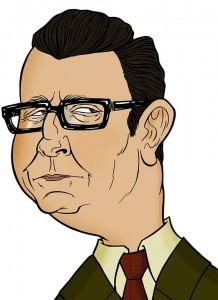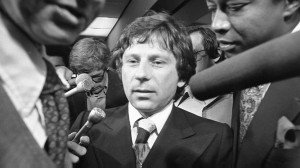RICHARD’S “CANADA AM” REVIEWS FOR JUNE 5 WITH BEVERLY THOMSON.
 Richard’s “Canada AM” reviews for “Spy,” “Entourage” and “Hungry Hearts.”
Richard’s “Canada AM” reviews for “Spy,” “Entourage” and “Hungry Hearts.”
Watch the whole thing HERE!
 Richard’s “Canada AM” reviews for “Spy,” “Entourage” and “Hungry Hearts.”
Richard’s “Canada AM” reviews for “Spy,” “Entourage” and “Hungry Hearts.”
Watch the whole thing HERE!
Perhaps the overriding lesson learned from “Hungry Hearts,” a new thriller starring Adam Driver and Alba Rohrwacher, is that it may not be a great idea to marry a person you meet in a public washroom. From that opening scene—the “meet cute”—that brings these two twenty-somethings together, director Saverio Costanzo takes the audience on a ride that is part “She’s Having a Baby,” part “Rosemary’s Baby.”
It’s a whirlwind romance for Jude (Driver) and Mina (Rohrwacher) after their initial lavatory love-in. They marry, move to New York and soon enough are expecting their first child. After giving birth Mina starts to exhibit strange, controlling behaviour. Concerned about pollution she refuses to take the child outside and her attitude toward doctors and vaccinations makes Jenny McCarthy seem tolerant. When the baby’s health is compromised Jude knows he must take steps, but how do you tell someone they are killing their child with too much care?
“Hungry Hearts” isn’t a traditional horror film, it’s a slow burn look at the fragile nature of the love of an over protective mother. Director Costanzo gradually builds the tension, visualizing Mina’s claustrophobic world with subtle visual tricks that create a sense of unease. The stale air of the apartment becomes palpable as the story of Mina’s suffocating love continues.
What sets “Hungry Hearts” apart from typical horror is Costanzo’s refusal to treat Mona like a monster. She is killing her child, but Jude still loves her, so Mina’s actions can be interpreted as a whirlwind of desperation and hysteria rather than evil. Rohrwacher’s mix of fragility and steely resolve brings Mina’s neurosis to vivid life. Driver’s Jude is all controlled anger and frustration, often seen up-close-and-personal through Costanzo’s super tight close-ups. Both give remarkable performances in a film that reverberates with themes first explored by Roman Polanski and Alfred Hitchcock but given a new surreal twist here.
 Thanks to Sophie Sinemania for the cool portrait! I’m really excited that she took the time to draw me!
Thanks to Sophie Sinemania for the cool portrait! I’m really excited that she took the time to draw me!
Her excellent new book Sinemania! (graphic interpretations of the lives and careers of 23 North American and European directors from the past and present, including Woody Allen, Alfred Hitchcock, Roman Polanski, Quentin Tarantino, and Orson Welles from ECW Press) is in fine and not so fine book stores everywhere!
Also… you can find it HERE!
Given director Roman Polanski’s recent legal troubles it’s hard not to infer some deeper meaning into the plight of “The Ghost Writer’s” ex-Prime Minister (Pierce Brosnan) accused of war crimes. In a moment of art imitating life Adam Lang’s lawyer says, “I strongly advise you not to travel to any country with extradition policies.” If Polanski had listened to that advice he might not have had to finish editing this movie from a jail in Switzerland.
Within Lang there are echoes of Tony Blair. He’s a popular, if controversial ex-Prime Minister—“He wasn’t a politician,” says the ghost writer, “he was a craze.”—with a ten million dollar book deal and a dead co-writer. The late journalist was found washed up on shore near Lang’s remote Cape Cod beach house under very mysterious circumstances. Pitch hitting for the late writer is Ewan McGregor’s character—he doesn’t have a name in the film—a professional ghost writer whose biggest hit was a biography of a magician called “He Came, He Sawed, He Conquered.” His job is to turn “incoherent rambling into a book.” Soon, however, his job is complicated when Lang is accused of war crimes by a former colleague. Untangling facts that may (or may not) place his own life in danger he turns from writer-for-hire to investigative journalist.
There is so much to like in “The Ghost Writer” that the few lapses in credulity are easy to forgive. I mean, are we really to believe that a massive conspiracy could be figured out using google? What’s next? Sherlock Holmes using Ask Jeeves? Apart from that bit of silliness Polanski has crafted a film that can comfortably sit beside “Three Days of the Condor” and “The Parallax View” for political intrigue.
The pacing is deliberate, not slow, but deliberate. Clues are doled out carefully, keeping red herrings to a minimum and allowing suspense to build with each new nugget of information. Tension and paranoia build with every scene. This is the man who made “Repulsion” and “Rosemary’s Baby,” so he knows how to make the mundane sinister. Ringing phones and loud raps on doors create an ominous atmosphere where danger is around every corner.
Add to that some interesting work to show the futility of the writer’s job. Watch in the background, the director places a gardener endlessly sweeping up dead leaves from the compound’s many patios, only to have them blow out of his wheel barrel every time he makes any progress. It’s a clever metaphor for the writer’s Sisyphean search for the truth. As he gets in over his head, trying to unravel years of twisted political strategy, I wanted to paraphrase Polanski’s most famous movie, “Chinatown.” “Forget it, writer. It’s politics.”
McGregor, who has played a writer twice before in “Moulin Rouge,” later in “The Men Who Stare at Goats,” is convincing but really shines when he is working opposite Pierce Brosnan. I’m willing to overlook Brosnan’s recent turn as a half man / half horse in “Percy Jackson and the Olympians” when he can be this good. He looks like a politician, like he was made for photo ops in front of private jets, waving to his constituents, but it is in the cat-and-mouse dialogue between Lang and the writer that he does his best work.
“The Ghost Writer” is Polanski’s first film in five years, and for those willing to judge the art, not the artist, it is as satisfying a thriller as we’ll see this year.
It is likely that director Roman Polanski will not be buying a condo near you any time soon. Not only because he would be arrested if he set foot on North American soil—he’s a fugitive from American justice—but because he clearly sees the confined spaces of apartment life as stifling, claustrophobic and toxic. In movie after movie—“The Tenant,” “Repulsion,” “Rosemary’s Baby” and now “Carnage”—these closed in spaces are scenes of tension and strife.
Based on Yazmina Reza’s play “God of Carnage” the film has a simple premise. Nancy and Alan Cowan (Kate Winslet and Christoph Waltz) pay a visit to the Brooklyn apartment of Penelope and Michael Longstreet (Jodie Foster and John C. Reilly) to discuss an altercation between their children in a nearby park. At first, at last superficially, all seems to go well, despite Alan’s insistence on having loud cell phone conversations and Penelope’s passive aggressive tirades. Soon, however, civility gives way to anarchy.
“Carnage” is a comedy of manners—bad manners. The humor—and there are many laughs—however, come from the situations and not jokes with punch lines.
Polanski deliberately keeps the style of the film simple and focuses on the performances and the dialogue. It’s all about the words—and one unexpected but spectacular puke scene—and not one syllable is out of place. Only Polanski, with the aid of two great actors—Waltz and O’Reilly—could make a conversation about toilet flush mechanisms so menacing and so funny.
It’s a sharply written war of words performed by actors who are clearly relishing the chance to get under the skins of their characters and each other. Nancy, Penelope and Michael are all as thinned skinned as the cheap veneer on Michael’s bookshelf. Only Alan, the cutthroat lawyer, seems to understand and appreciate the dynamic in play.
As the undercurrent of tension in the early scenes gives way to the overt hostility of the climax you can see the actors stretching their muscles.
Although her character is tightly wound Jody Foster has rarely been this loose on screen. It’s a highly theatrical performance, complete with bulging forehead veins and furrowed brows, which expertly reveals not only the character’s political correctness, but also her self pity and ultimately her self loathing. When she says, “There’s no reason to lose our cool here,” you know she doesn’t really mean it.
Waltz finds his best role since “Inglourious Basterds” and Winslet is gloriously unhinged. Only O’Reilly seems slightly out of place. He’s fine in the early scenes as the big friendly lug trying to avoid confrontation, but less effective later on when his true colors are revealed.
“Carnage” pokes fun at the middle class, constantly shifting the power from couple to couple, gender to gender, class to class and person to person. It’s a microcosm of society, a fluid dynamic that, despite an abrupt ending that may leave some scratching their heads, is a fascinating look at what lies underneath the carefully manicured facades many of us present to the public.
 Swiss police took director Roman Polanski into custody late Saturday on a 30-year-old U.S. arrest warrant for having sex with a 13-year-old girl.
Swiss police took director Roman Polanski into custody late Saturday on a 30-year-old U.S. arrest warrant for having sex with a 13-year-old girl.
Polanski had travelled from his home in France to Switzerland to receive an honorary award at the Zurich Film Festival when he was held at the airport, festival officials said in a statement.
The Swiss Justice Ministry released a statement Sunday, saying the U.S. had been seeking Polanski’s arrest in various countries since 2005.
“There was a valid arrest request and we knew when he was coming,” ministry spokesperson Guido Balmer told The Associated Press. “That’s why he was taken into custody.”
According to Balmer, American authorities will have to issue a formal extradition request if they want Polanski returned to U.S. soil.
The director’s French lawyer, Georges Kiejman, told France-Inter radio that it is “too early to know” if Polanski will face extradition.
“The proceedings must take their course,” Kiejman said. “For now we are trying to have the arrest warrant lifted in Zurich.”
It is still unclear why Polanski was arrested now, given that he regularly travels to Switzerland.
According to Balmer, the arrest of someone facing an international warrant is “automatic when you know when and at what time the individual is coming.”
Balmer denied that Switzerland was trying to appease U.S. officials, with whom Swiss authorities recently disagreed over tax evasion issues and concerns about Americans hiding money in Swiss bank UBS AG.
“There is no link with any other issues in question,” Balmer said.
France’s culture minister said Sunday that he was “dumbfounded” by the arrest.
Frederic Mitterrand said he “strongly regrets that a new ordeal is being inflicted on someone who has already experienced so many of them.”
According to a statement released by the culture ministry, Mitterrand is in contact with French President Nicolas Sarkozy, “who is following the case with great attention and shares the minister’s hope that the situation can be quickly resolved.”
Polanski has lived in France since 1978, when he fled the United States after pleading guilty the year before to unlawful sexual intercourse with a 13-year-old girl.
The director, now 76, has asked a U.S. appeals court in California to overturn another judge’s refusal to throw out the case. Polanski has levelled allegations of misconduct at the original judge in the case, who is now deceased, saying he reneged on a previously arranged plea bargain.
Polanski was accused of raping the teenager during a photo shoot in 1977 at the home of Jack Nicholson, while the actor was away. The girl testified that the director gave her champagne and part of a Quaalude pill and proceeded to have intercourse with her despite her protests.
Polanski pled guilty to one of six charges, unlawful sexual intercourse. He was sent to prison for 42 days of evaluation.
Defence and prosecution lawyers were satisfied with the 42-day sentence. However, the judge tried to overturn the plea bargain, which would have meant more prison time and eventual deportation for the director, who chose instead to flee to France.
The victim, who identified herself publicly many years ago, has supported Polanski’s attempts to have the case dismissed.
Samantha Geimer, now 45, has said she would like to put the ordeal behind her. She previously sued Polanski for an undisclosed sum.
Despite the director’s arrest, the film festival announced that it will go ahead with a planned retrospective of his work.
Polanski was born in France, but as a child moved to Poland. He escaped Krakow’s Jewish ghetto as a child, but his mother died at Auschwitz.
He began his career in Poland, earning an Oscar nomination for best foreign-language film in 1964 for his movie “Knife in the Water.”
His career in the U.S. began in 1968, when he directed “Rosemary’s Baby.” However, his Hollywood fairytale was cut short with the gruesome murder of his actress wife, Sharon Tate, in 1969 at the hands of followers of Charles Manson. Tate was eight months pregnant when she was killed.
Polanski also directed the classic film, “Chinatown,” in 1974, and received a directing Oscar in absentia for his 2002 film, “The Pianist.”
He is married to French actress Emanuelle Seigner, with whom he has two children.
The French Foreign Ministry said in a statement Sunday that it has directed the French ambassador to Switzerland to help arrange a consular visit for Polanski as soon as possible.
According to the statement, Foreign Minister Bernard Kouchner has told Swiss counterpart Micheline Calmy-Rey he hopes “Polanski’s rights (will) be fully respected and that the case would quickly result in a favourable outcome.”
CTV film critic Richard Crouse said the film community is shocked by Polanski’s arrest, but it likely won’t damage his career.
“It’s a real case of judge the art, not the artist,” he told CTV News Channel on Sunday.
“His filmmaking peers see him as an extremely talented but troubled man who was still doing good work.”
Crouse explained that Polanski has had a hard life filled with setbacks, but his career has survived through it. The director survived the holocaust as a child, but his mother was murdered in the Auschwitz prison camp. His wife, actress Sharon Tate, and their unborn child were murdered by followers of Charles Manson in a random attack in 1969.
Then in 1977, he pleaded guilty to sex with the 13-year-old girl and then left the country.
“Maybe if he’s extradited, finally we’ll be able to put this to rest once and for all,” said Crouse.
With files from the Associated Press.